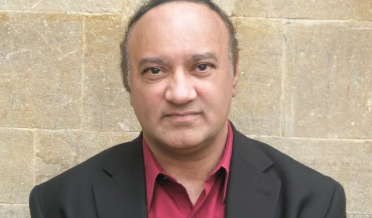Dr Musharraf Hussain Al-Azhari
I was sitting on the floor amidst dozens of disciples and devotees in a cramped room. Everybody was waiting in anticipation, the sense of devoutness and love filled the air, and then the door opened, and a handsome, beautifully robed white bearded elderly man walked in gracefully. Immediately everyone stood up and the room fell silent. The Pir sahib was smiling, showing his joy of seeing the disciples and went straight to the front of the room and sat on the arm chair peacefully. He asked everybody to sit down, as I was about to sit down on the floor, he told me to sit on the chair next to him. After asking me how I was, he instructed me, “Dr sahib you should do a weekly program on Noor TV”, to which I humbly agreed. This was Pir Aluaddin Siddiqui, who passed away early in February this year, as the Angels escorted his pure soul broadcasting: “O contented person! 28 Return to your Lord cheerfully and highly recognized, 29 now join the company of My servants 30 and come in into My Garden.” (Al-Fajr:27-30) His funeral took place in the Aston Park Birmingham, Daily Mail estimates 20,000 people attended the funeral. Muslim scholars from all over the country came to pay their tribute and homage to the wonderful saint and scholar.

Early childhood and Islamic education
Pir Aluaddin Siddiqui was born in 1936, in the remote hilly and scenic area of Azad Kashmir in the village of Nerian Shareef. His father Pir Ghulam Mohiuddin Ghaznavi (d:1975) was the spiritual director, a Pir sahib of the Naqshbandi order. He came from the Sunni Sufi tradition, with a strong emphasis on the love of the Messenger. He believed this was the essence of Islam, the core of Quran’s teachings, no one could attain Divine love without this. He was famous in Azad Kashmir for his religious activities and spiritual guidance. His disciples came to him in his Khanagha, the retreat, where they would stay for few days, the young Siddiqui was tasked to run the langar, the soup kitchen and serve them, feed them and made sure their stay was comfortable. So early on it was drilled into him to serve others, this he continued diligently throughout his long illustrious career. It is worth noting that whenever I visited him he would insist that I eat before leaving. His primary education was from local school, and in his teenage years he was enrolled in the seminary of Jamia Rahmania
Hazara, near Peshawar, Mufti Gul Rehman of Birmingham mentions meeting Pir sahib there when he was a student. From here he went for further studies to Maulana Sardar Ahmed of Faisalabad. Maulana Sardar Ahmed was the most famous Seminarian and professor of Hadith and Tafsir in Pakistan. Students from all over Pakistan flocked to his Seminary. Later he went to Jamia Naimia in Lahore and finally he studied tafsir of the Quran from one of the leading commentators Allama Abdal Ghafoor Hazarvi, eventually graduating at the age of 24 years. His proud father honoured him with the mantle of spiritual directorship.

Armed with Knowledge of Sharia and wearing the mantle of a spiritual guide he stepped boldly into the field of Dawah, Tableegh and mentoring the seekers of Allah. Pir Aluaddin had a melodic and tuneful voice and his passionate fiery speeches were peppered with Persian couplets from the poetry of Iqbal and Rumi. This would be the hall mark of his preaching for the rest of his life. The grand Pir sahib Ghulam Mohiuddin must have been delighted with his talented son.
First trip to Britain
In 1968 Pir sahib toured England for the first time, as a spiritual director he went up and down the country, visiting, meeting and spending time with his father’s disciples. This was a customary practice of a directors of Naqshbandi order where they provide advice and guidance to their disciples. This is a lovely practice of mentoring and providing spiritual guidance to keen devotees who didn’t have time to go out and seek knowledge and guidance. An effective way of building relationship, teaching the message of Islam and motivating people to be spiritual and avoid the trappings of the World. In those days, there were very few mosques and Imams in England, so, Pir Sahib’s visit was very timely and beneficial. The young immigrants, mostly males from Azad Kashmir had come to work in the post war Britain, they were in dire need of spiritual guidance and nourishment. so, many young men came into his fold and became his disciples. I first met Pir sahib in 1974 in Keighley town hall, west Yorkshire. The glowing rosy face, with flowing dark beard gave Pir sahib a saintly radiance that marked him out from the rest. His sweet voice, melodious recitation of Quran and narration of Rumi’s fables won the hearts of the audience. His speech impressed me, his preaching and teaching won the hearts and minds of the seekers of Truth.
Inheriting the prayer mat
In 1975, his father, Pir Ghulam Mohiuddin passed away, so his illustrious son at the age of 38 succeeded him as the new Sajjada Nasheen, a metonym for a spiritual successor, that literally means, “The occupant of the prayer mat”. Not the heir to throne, nor an heir of a rich father who inherits the worldly wealth, but the one who takes the prayer mat, a place of worship, devotion to Allah and service to needy humanity. He was now the full Spiritual director of Nerian Shareef. Pir sahib had thirty deputies, Khulafa, these were selected individuals who he trusted with the responsibility of developing others, spreading his teachings, each one of them in themselves was an organisation, committed to the Grand Pir sahib’s mission. It’s believed that he had over quarter of million disciples at the time of passing away . A huge responsibility, but the young Pir sahib was ready for the challenge, to guide, serve and lead devotees, rich and poor, men and women old and young.
The works and achievements of
Pir Sahib
Pir Sahib was based in Nerian Shareef Azad Kashmir, but he was always out and about visiting his disciples from Gilgit to Gujrat and from kotly to Karachi, Bradford to Birmingham. He regularly visited UK, a country which was thirsty for his guidance. In 2004 he formally set up the Mohiuddin trust in UK. Its main aim was to raise funds for the educational Institutes which Pir sahib had set up in Azad Kashmir and Pakistan. These mosques, madrasas and schools number in hundreds. According to Maulana Riaz Samdani Pir sahib founded: 2 large hospitals, a university, and a medical college. These were ambitious projects, raising funds, constructing the buildings, recruiting the staff to run them must have been very difficult. In his efforts he won the cooperation of the government of Azad Kashmir to establish the Mohiuddin university the medical school and the hospital. So, here we see the spiritual director’s anxiety for both the physical and spiritual health of the impoverish people of Azad Kashmir. This is now thriving medical school which annually produces 100 qualified male and female doctors.
In 2006, Pir sahib established the Noor TV which broadcasts religious programs on Sky globally, undoubtedly a visionary step. It provided Pir Sahib a platform to spread the beautiful message of Islam Worldwide. He personally took deep interest in developing the TV and every evening he did an hour long lesson from Rumi’s Mathnavi, this gave him access to thousands of people in Europe and beyond. It gave him fame beyond the boundaries of Britain. His sweet and melodious style attracted the viewers in droves.
Pir sahib was very good at winning the heart and minds of his followers and motivating them to spend their wealth in the path of Allah. He raised funds regularly for his dozens of projects in Pakistan. Particularly, in 2010 when Pakistan faced severe flood, he raised hundred of thousands of pounds to do relief work in the affected areas. More than 5,000 displaced people were taken care of, and housed in Azad Kashmir.
The teachings
of Pir sahib
Pir sahib had a mission, a true Mohammedi, servant of the blessed Mustafa, he was a restless soul, so where ever he went he preached, taught pearls of wisdom, delivered practical advice. His table talks were very eloquent and effective, the following selection reveals the beauty and effectiveness of his words.
Taking verses out of context
One day the Pir sahib was visiting a disciple’s home; it was time to pray so someone called the Azan. Someone sternly said, “whoever is going to pray get ready and whoever is not let them stay seated. There is no compulsion in this”. The Quran says, “There is no compulsion in religion.” Pir sahib corrected him by saying, “Do you know what is the meaning of compulsion in this verse?” It means don’t force anyone to embrace Islam, people are free to choose their faith. However, once a person has become a Muslim he is obliged to carry out certain duties, for example Allah said, “Punish both the adulterer and adulteress with one hundred lashes” (All-Nur:24). Isn’t this compulsion? He continued, “it’s become common to take verses out of their context, and just relay on the translation.”
Understanding the difference between necessities of life and the purpose of life
He once said, “A home, spouse, children, livelihood, wealth and dignity are the necessities of life, however, the purpose of life is different. It is, “I created Jinn and humans with the sole purpose that they worship me.” Both are different, unfortunately people have confused necessities with the purpose, and that’s why spiritually they are failures. The prophets and the saints have always paid attention to the purpose of life. With regards to the necessities one ought to earn enough to meet his needs so he isn’t dependent on others.”
Test of faith
In a gathering of Murids he said, “Person’s faith is tested when his desires oppose the Divine will. At that moment if one sacrifices his desire and obeys Divine will then he is true believer, but the one who ignores it and follows his own whim, is a loser. He will be considered lacking Love of Allah.”
Pir sahib was cautious and a traditionalist
Someone once asked, “can we build a masjid on top of a shopping centre?” He replied, “The masjid is a plot of land that begins from the depths of the earth to the celestial throne. Those are its limits. No Imam has given its permission. However, you can build a Musalla (a place of prayer) anywhere.”
The impact of worship on body and soul
One day someone asked, “Does worship just touch the soul or does it also affect the body? He replied, just as worship is compulsory on the soul and the body so it impacts both of them.”
On Mindfulness, Taffakur
Pir sahib said, “One should always be mindful of Allah despite being busy earning his livelihood, this mindfulness is real a bliss. The Sufi has a different understanding of mindfulness: to be aware that one fully complies with the Divine commands, his attitude, speech, character everything Is closely monitored. Ensuring that he isn’t careless about his responsibilities, ever vigilant and always watching oneself. Zikr is a method to achieve this state of mindfulness… On the day of Judgement Allah will present a group of business people who were also mindful; “Men who were not distracted by worldly business from the remembrance of Allah.” (Al-nur;35)
Rule about seeking the world
If material wealth doesn’t become a barrier between Human and the Lord then there’s nothing wrong with that. Allah teaches a prayer: “O Lord! give us the best in the world, and the best in the Hereafter and save us from the Fire of Hell.” Just notice, first seeking worldly wealth, then the Hereafter and protection from Hellfire. So we learn that we must earn our livelihood so that we are not dependent on others. However, don’t regard the world as the be all and end all! Along with that make your Hereafter. Otherwise prepare yourself for the Hell.”
Why join Zikr gatherings?
“We remember Allah for inner development, controlling the ego, and purifying the heart. It builds confidence, removes barriers, overcomes worries so that the devotee can attain Divine nearness.”
Love and obedience
Love is a powerful inner feeling, how is it expressed? What is its outward expression? Allah has made the obedience of Prophet its proof. “Say, if you love Allah then follow me so Allah will love you and forgive your sins.”
The need for the spiritual director
Just like the root of a tree supplies water and minerals to all its branches without discrimination likewise a spiritual director blesses all who are attached to him… So a Murid the disciple should abandon his own desires and follow the spiritual guide.
His prominent works in UK:
Through his affective leadership Pir sahib encouraged his disciples to set up mosques in different part of the UK, Particularly in London, Birmingham, Peterborough and Bradford. In 2012, he bought a large college in Burnley and opened a girls’ school and college. Later it moved to Bradford in 2015.







